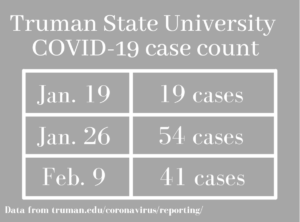
During a recent Board of Governors meeting, Truman State University President Sue Thomas announced that the University will modify its COVID-19 policy by lowering the quarantine period from 14 to 10 days to reflect the same change in the Adair County Health Department’s policy. Thomas explained that the University bases its policies off of Adair County. The Centers for Disease Control and Prevention still recommends a 14-day quarantine as the gold standard.
We, The Index Editorial Board, dissent from this new policy and ask that the University follow the CDC’s gold standard recommendations.
As reported on the front page of the latest issue, Truman more than doubled its case numbers recently. Meanwhile, Adair County’s cases continue to soar well over 2,000. Now is not the time to become lax in our approach to this pandemic. It’s time to double down on precautions and do more than we have done in the past.
Prior to these past couple weeks, Truman had been faring much better than Adair County in the rise of COVID cases. The University had stricter policies and more adherence to those policies than the surrounding area. Truman implemented a mask mandate before the city or county, and while the Adair County Health Department has stopped contact tracing outside the household of the positive patient, Truman continues with it. The University has been going above and beyond Adair County in regard to COVID measures since the beginning of the pandemic, so why are we following this guidance? Perhaps, the county should be taking notes from the University’s policies.
Brenda Higgins, associate vice president for student health & wellness, said recently that she believes the rise in cases at Truman is a result of students feeling fatigued with the regulations and ready to get back to a sense of normalcy. We, as fellow students, understand this fatigue. We also understand the hopeful feelings of hearing about the development and distribution of vaccines. What we do not understand is why more lenient policies follow these feelings when the case numbers necessitate the highest possible precautions.
Even with this fatigue and hopefulness, we cannot ignore that COVID-19 is still a present problem in the United States and our own community. It is important that we recognize the fatigue and allow ourselves to feel hopeful in these trying times, but we, and our policies, must also remain alert and cautious.

